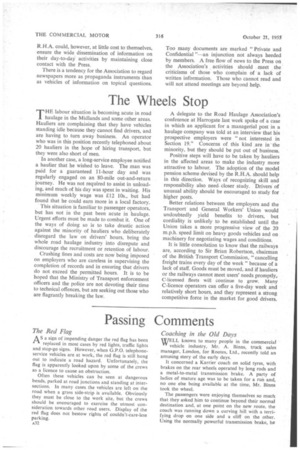The Wheels Stop
Page 34

If you've noticed an error in this article please click here to report it so we can fix it.
THE labour situation is becoming acute in road haulage in the Midlands and some other areas. Hauliers are complaining that they have vehicles standing idle because they cannot find drivers, and are having to turn away business. An operator who was in this position recently telephoned about 20 hauliers in the hope of hiring transport, but they were also short of men.
In another case, a long-service employee notified a haulier that he wished to leave. The man was paid for a guaranteed 11-hour day and was regularly engaged on an 80-mile out-and-return journey. He was not required to assist in unloading, and much of his day was spent in waiting. His minimum weekly wage was £.12 10s., but had found that he could earn more in a local factory.
This situation is familiar to passenger operators, but has not in the past been acute in haulage. Urgent efforts must be made to combat it. One of the ways of doing so is to take drastic action against the minority of hauliers who deliberately disregard the law on drivers' hours, bring the whole road haulage industry into disrepute and discourage the recruitment or retention of labour.
Crushing fines and costs are now being imposed on employers who are careless in supervising the completion of records and in ensuring that drivers do not exceed the permitted hours. It is to be hoped that the Ministry of Transport enforcement officers and the police are not devoting their time to technical offences, but are seeking out those who are flagrantly breaking the law. A delegate to the Road Haulage Association's conference at Harrogate last week spoke of a case in which an applicant for a managerial post in a haulage company was told at an interview that his prospective employers were "not interested in Section 19." Concerns of this kind are in the minority, but they should be put out of business.
Positive steps will have to be taken by hauliers in the affected areas to make the industry more attractive to labour. The adoption of the model pension scheme devised by the R.H.A. should help in this direction. Ways of recognizing skill and responsibility also needcloser study. Drivers of unusual ability should be encouraged to study for higher posts.
Better relations between the employers and the Transport and General Workers' Union would undoubtedly yield benefits to drivers, but cordiality is unlikely to be established until the Union takes a more progressive view of the 20 m.p.h. speed limit on heavy goods vehicles and on machinery for negotiating wages and conditions.
It is little consolation to know that the railways are, according to Sir Brian Robertson, chairman of the British Transport Commission, "cancelling freight trains every day of the week" because of a lack of staff. Goods must be moved, and if hauliers or the railways cannot meet users' needs promptly, C-licensed fleets will continue to grow. Many C-licence operators can offer a five-day week and relatively short hours, and they represent a strong competitive force in the market for good drivers.




































































































